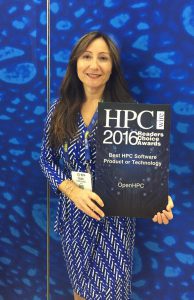
OpenHPC Boardmember Figen Ulgen Receives the HPCwire Reader’s Choice Award on Behalf of OpenHPC at SC’16.
We are pleased to announce that OpenHPC has been awarded the 2016 HPCwire Reader’s Choice Award for Best HPC Software Product or Technology.
“This important and widely disseminated award by HPCwire recognizes the significance of the OpenHPC initiative by the broad community of industry, government, and academia to satisfying a critical need for future growth in availability, usability, robustness, and ultimate capability of software infrastructure in supercomputing.” Dr. Thomas Sterling said. “It is also gratifying to the many contributors who have invested their time and expertise over the last year to achieve this success.”
Dr. Thomas Sterling is the Director of the Center for Research in Extreme Scale Technologies (CREST) at Indiana University and sits on the OpenHPC Technical Steering Committee as a Component Development Representative and sits on the OpenHPC Business Governing Board as representative of the Academic members
The Readers’ Choice winners are determined through election by HPCwire readers. The process started with an open nomination process, with voting taking place throughout the month of September. These awards are widely recognized as being among the most prestigious recognition given by the HPC community to its own each year.
“From thought leaders to end users, the HPCwire readership reaches and engages every corner of the high performance computing community,” said Tom Tabor, CEO of Tabor Communications, publisher of HPCwire. “Receiving their recognition signifies community support across the entire HPC space as well as the breadth of industries it serves. Each year we honored to engage with our readership through the Readers’ and Editors’ choice program, and to recognize these efforts and make the voices of our readers heard. Our thanks and highest congratulations go out to all the winners for their outstanding breakthroughs and achievements.”
Read about the all of the winners here.
We would like to congratulation the numerous OpenHPC members that also won awards from HPCwire:
- EBest Use of HPC Application in Life Sciences – Editors’ Choice
Earlham Institute (previously TGAC) uses SGI UV 300 for analysing highly-complex wheat genome – SGI’s largest instance for life sciences. - Best Use of HPC in Entertainment – Readers’ Choice
DreamWorks Animation utilizes HPE-enabled “scalable multi-core processing” for producing lifelike imagined environments that detail muscle, fur, feathers and cloth in animated films. - Best Application of Energy-Efficient HPC – Editors’ Choice
The Texas Advanced Computing Center (TACC) collaborated with Japanese government agency NEDO to explore improved energy efficiency using an HPE Apollo 8000 system (Hikari) - Best HPC Server Product or Technology– Editors’ Choice
SGI UV 300 - Best HPC Cluster Solution or Technology – Readers’ Choice
Intel Parallel Studio XE Cluster Edition - Best Data-Intensive System (End User focused) – Editors’ Choice
Pittsburgh Supercomputing Center Bridges, architected by HPE - Best HPC Collaboration Between Government & Industry – Readers’ Choice
LANL and Seagate’s Cooperative Research and Development Agreement (CRADA) develops power-managed disk and software solutions for deep data archiving and other next gen technologies. - Best HPC Collaboration Between Academia & Industry – Readers’ Choice
OpenPOWER Academic Discussion Group is a community within the OpenPOWER Foundation focused on collaboration between industry and academia to develop a broad ecosystem for the POWER architecture.The Texas Advanced Computing Center (TACC) Lonestar 5 supercomputer, now in full production and built off technologies from Cray, Intel & DataDirect Networks, anchors TACC’s collaboration with industry program. - Top Supercomputing Achievement – Readers’ Choice
SDSC, TACC, Open Science Grid, XSEDE & UNL’s Holland Computing Center collaborate to verify the groundbreaking LIGO gravitational wave discovery. - Top Supercomputing Achievement – Editors’ Choice
SDSC, TACC, Open Science Grid, XSEDE & UNL’s Holland Computing Center collaborate to verify the groundbreaking LIGO gravitational wave discovery. Sunway TaihuLight at the National Supercomputer Center in Wuxi, China, for building a 93-petaflops (LINPACK) supercomputer - Top 5 Vendors to Watch – Readers’ Choice
Cray, IBM, Intel, NVIDIA, Seagate - Top 5 Vendors to Watch – Editors’ Choice
Dell EMC, Fujitsu, HPE, IBM, NVIDIA - Outstanding Leadership in HPC – Editors’ Choice
Dan Stanzione, Executive Director, Texas Advanced Computing Center (TACC) Thomas Sterling, Professor of Informatics & Computing, Indiana University
NOV
